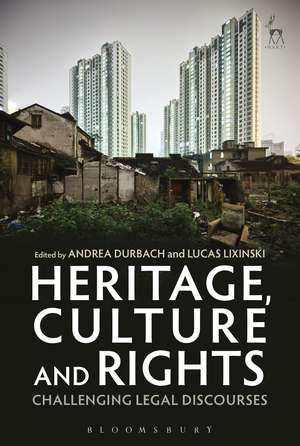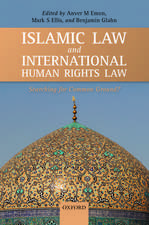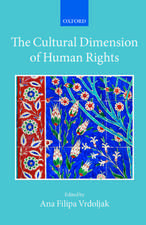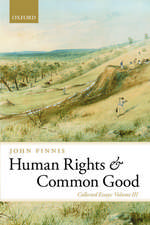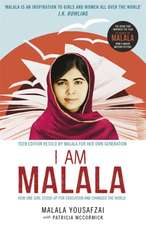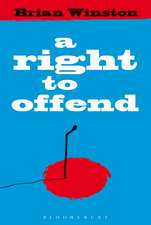Heritage, Culture and Rights: Challenging Legal Discourses
Editat de Professor Andrea Durbach, Lucas Lixinskien Limba Engleză Hardback – 17 mai 2017
| Toate formatele și edițiile | Preț | Express |
|---|---|---|
| Paperback (1) | 320.25 lei 6-8 săpt. | |
| Bloomsbury Publishing – 18 sep 2019 | 320.25 lei 6-8 săpt. | |
| Hardback (1) | 600.15 lei 6-8 săpt. | |
| Bloomsbury Publishing – 17 mai 2017 | 600.15 lei 6-8 săpt. |
Preț: 600.15 lei
Preț vechi: 697.85 lei
-14% Nou
Puncte Express: 900
Preț estimativ în valută:
114.84€ • 118.48$ • 95.83£
114.84€ • 118.48$ • 95.83£
Carte tipărită la comandă
Livrare economică 26 martie-09 aprilie
Preluare comenzi: 021 569.72.76
Specificații
ISBN-13: 9781849468084
ISBN-10: 1849468087
Pagini: 312
Dimensiuni: 156 x 234 x 30 mm
Greutate: 0.62 kg
Editura: Bloomsbury Publishing
Colecția Hart Publishing
Locul publicării:London, United Kingdom
ISBN-10: 1849468087
Pagini: 312
Dimensiuni: 156 x 234 x 30 mm
Greutate: 0.62 kg
Editura: Bloomsbury Publishing
Colecția Hart Publishing
Locul publicării:London, United Kingdom
Caracteristici
The author examines a range of issues across Africa, Asia, Europe, Latin America and Australia to consider , the extent to which the legal tools of international human rights law help or hinder heritage protection.
Notă biografică
Andrea Durbach is Professor at the Faculty of Law at the University of New South Wales and Director of the Australian Human Rights Centre.Lucas Lixinski is Senior Lecturer at the Faculty of Law at the University of New South Wales and a Project Director at the Australian Human Rights Centre.
Cuprins
Introduction Andrea Durbach and Lucas LixinskiPart 1: Human Rights and Heritage: A Possible Alliance?1. Opening the Toolbox of International Human Rights Law in the Safeguarding of Cultural Heritage Francesco Francioni and Lucas Lixinski2. Culture, Rights and the Post-2015 Development Agenda Ben Boer3. Cultural Heritage, Human Rights and the Privatisation of War Ana Filipa Vrdoljak4. The Urban Village and the Megaproject: Linking Vernacular Urban Heritage and Human Rights-based Development in the Emerging Megacities of Southeast Asia Scott HawkenPart 2: Heritage in Tension with Rights 5. Between Rights in the City and the Right to the City: Heritage,Character and Public Participation in Urban Planning Amelia Thorpe6. The Tension between Rights and Cultural Heritage Protection in China Stefan Gruber7. Heritage and Human Rights: Reframing the Conservation Ethic Josephine Gillespie8. The Poverty of World Heritage Management in Sub-Saharan Africa: The Legacy of Colonialismand Disregard of Human Rights Folarin ShyllonPart 3: Heritage as a Tool for Broader Political Transformation 9. Cultural Heritage as Transformation: A Study of Four Sites from Post-Apartheid South Africa Andrea Durbach10. Heritage Listing as Self-determinationLucas Lixinski11. World Heritage, Cultural Confl icts and Political Reconciliation Andrzej Jakubowski
Recenzii
It is explicitly a volume about "challenging legal discourses" and, as such, presents a timely contribution that sheds light on this particular angle of the link between heritage, culture, and rights. Overall, it is an interesting and accessible volume for anyone with an interest in heritage and rights, and a legal background is not strictly necessary.
Overall, this volume highlights some of the challenges and questions that arise when examining the intersection of human rights law and cultural heritage, including the challenge to marry the different values ascribed to cultural heritage. Moreover, the book provides yet another recognition of the need for an interdisciplinary approach to the research of cultural heritage protection and preservation. The authors present a thoughtful overview of core themes, providing an excellent introduction to this field of study in a clear and readable manner. This book is therefore highly recommended for practitioners and students alike.
This compilation brings hard questions about culture, cultural heritage and society into better focus... The scholarship demonstrated here deserves a strong recommendation for making more explicit the link between cultural heritage provision and human rights. Heightened awareness of the connection and its darker side makes it easier to develop international standards to advance rights relating to cultural heritage. If the restorative and transformative dimensions of cultural heritage for society can be kept in view, as this work does, change may start to happen.
Heritage, Culture and Rights possesses the kind of academic breadth of vision that indicates that it is destined to become a classic book in its category. The growing acknowledgement of the importance of local and global questions emerging at the intersection of heritage studies, human rights and the development agenda ensures the future importance of a work that seeks to bridge the gap between disciplinary 'silos' and build a constructive dialogue between disciplines, values and stakeholders.
Overall, this volume highlights some of the challenges and questions that arise when examining the intersection of human rights law and cultural heritage, including the challenge to marry the different values ascribed to cultural heritage. Moreover, the book provides yet another recognition of the need for an interdisciplinary approach to the research of cultural heritage protection and preservation. The authors present a thoughtful overview of core themes, providing an excellent introduction to this field of study in a clear and readable manner. This book is therefore highly recommended for practitioners and students alike.
This compilation brings hard questions about culture, cultural heritage and society into better focus... The scholarship demonstrated here deserves a strong recommendation for making more explicit the link between cultural heritage provision and human rights. Heightened awareness of the connection and its darker side makes it easier to develop international standards to advance rights relating to cultural heritage. If the restorative and transformative dimensions of cultural heritage for society can be kept in view, as this work does, change may start to happen.
Heritage, Culture and Rights possesses the kind of academic breadth of vision that indicates that it is destined to become a classic book in its category. The growing acknowledgement of the importance of local and global questions emerging at the intersection of heritage studies, human rights and the development agenda ensures the future importance of a work that seeks to bridge the gap between disciplinary 'silos' and build a constructive dialogue between disciplines, values and stakeholders.
